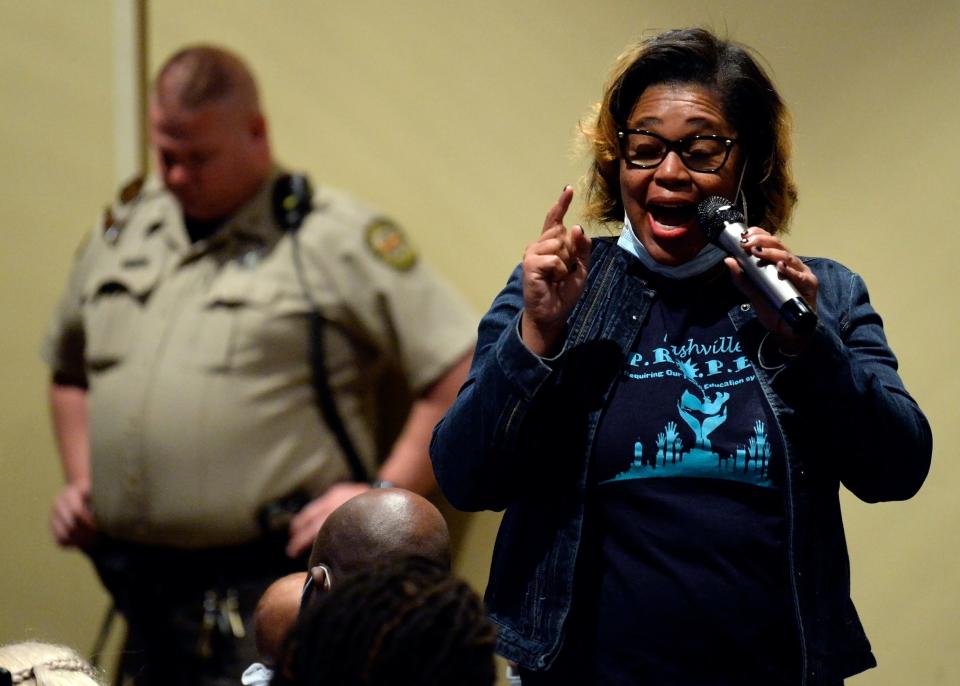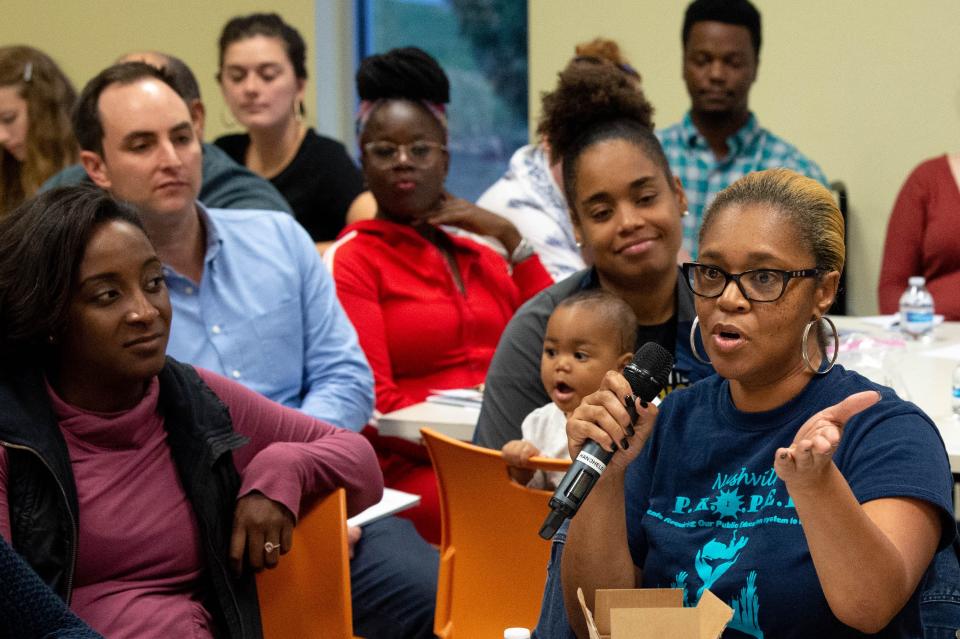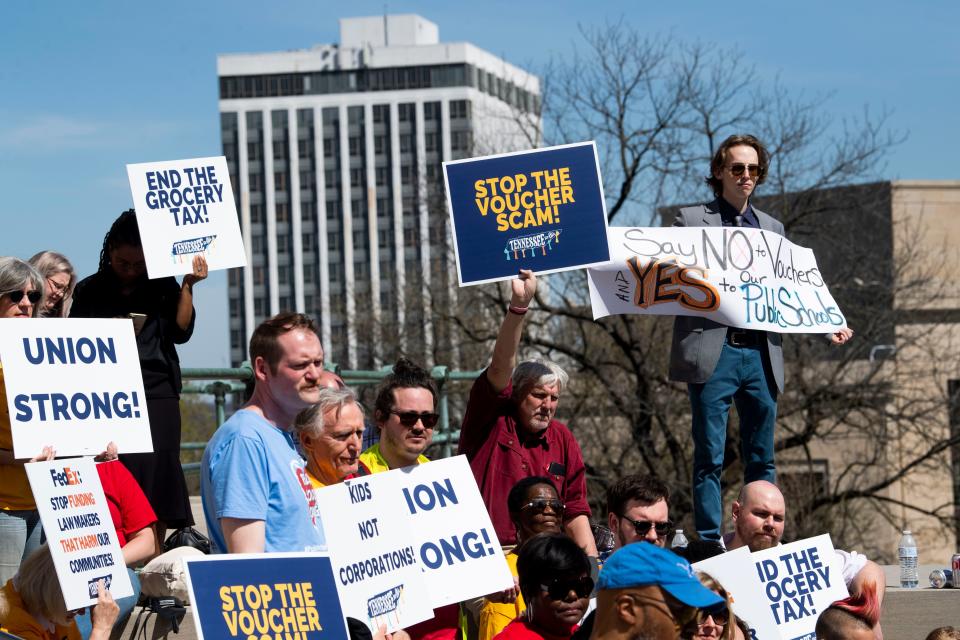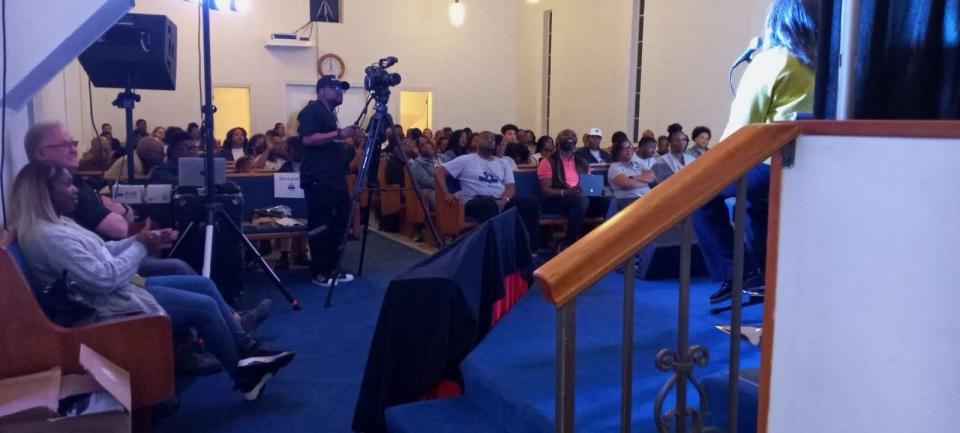Education advocate Sonya Thomas: Nashville public schools have a hidden literacy crisis
Sonya Thomas’s journey from parent to education advocate is paved with her own tears, tears she cried as she realized the youngest of her four children was struggling in school.
Despite his consistently respectable report cards and positive remarks from his teachers (he was and is, Thomas says, a “good kid”), Thomas sensed that something was awry. Her motherly instinct led her to transfer him to a new school for the seventh grade, and it was then that her nagging fears coalesced into a dire reality. Her son was still “good” and “prepared for class” and always “on task.” But he was also a middle schooler reading on a second-grade level.
In 2018, Thomas co-founded Nashville P.R.O.P.E.L., an advocacy group designed to equip parents, like herself, with the tools and information needed to help their children navigate the public education system. “PROPEL stands for Parents Requiring Our Public Education System to Lead,” the organization’s website reads. “Our children are brilliant and deserving of a world-class education. Our current public education system has failed generations of Black and Brown families so it’s up to us to change it.”
Since then, the work has been constant, though it remains unfinished. Thomas is unequivocal about this. When we speak, she makes frequent reference to a literacy crisis—one that is currently impacting students across the country, including here in Nashville. But while the focus is typically on the fact that the majority of students in Metro Nashville Public Schools are reading below grade level, Thomas’s most recent focus is whether teachers and schools are effectively communicating this information to parents.
PROPEL takes on 'hidden' literacy crisis in Nashville
Recently, Thomas and I discussed her work, as well as a white paper released by PROPEL on Wednesday. In “Nashville’s Hidden Literacy Crisis: What Parents are Doing About It,” she makes the knowledge gap clear: Because of positive report cards, 78% of the Nashville parents who were surveyed believe their kids are reading at grade level.

Meanwhile, data reveals that only 28.5% of students across MNPS—and only 19.6% of Black students—are.
“I do this work because I never want another parent to feel the way I felt when I realized my son was not getting the education he needed and he deserved,” she said. “When parents are ‘in the know,’ they take action. I believe parents aren’t taking action because they just don’t know.”
Editor's note: Below find excerpts from an interview between Andrea Williams and Sonya Thomas.
Andrea Williams: Your paper mentions the “history of reading injustice.” Please explain what that is and why it’s currently relevant.
Sonya Thomas: Reading injustice for Black people in America goes back to the days of enslavement. Where it was once a crime for Black Americans to learn how to read, today we see the same systemic injustice in schools where Black children are often lowest performing in reading and math. I see the genius in all children so, in my mind, it's not that our children can't learn to read. It's that a system that was set in motion long ago doesn't value us. At PROPEL, we know that literacy truly means liberation for our families. It’s life-changing, and that’s why we’re so focused on it.
After generations of failure, Nashville should focus on District 1 schools improvements
AW: And part of the solution, you believe, is letting parents know as early as possible when their kids are struggling.
ST: Schools know whether a child can read in kindergarten through second grade. There is no need to wait until TCAP (Tennessee Comprehensive Assessment Program) identifies whether a child can read on grade level when we have school level data available.
If your child is learning to play an instrument, you don’t wait until the recital to learn whether or not the instruction worked and that child has learned to play. Your child is getting regular instruction on how to play that instrument and you are likely getting regular reports on how your child is performing. Parents should get that information about their child when it comes to reading, and the public should know if children are reading at grade level prior to third grade when the state data is made public. We need those reports to be parent-facing, where parents understand what is going on with their child in real time.

AW: Why does the public need this information?
ST: 78% of parents don’t believe there’s a reading crisis, and we have less than 30% of kids reading on grade level, so there’s a lot of misrepresentation around literacy in Nashville. There’s a misrepresentation among the parents and the general population, otherwise we’d be burning the city down, knowing all these kids can’t read.
AW: Why do you think there’s such a lack of transparency toward parents from MNPS?
ST: No one will fight harder for a child’s right to read than their parent. But there is a belief gap about what parents are capable of. The system doesn't believe parents have the capability to understand. There is some intentional and unintentional data-hoarding going on. The district has done a lot of good work to comply with state literacy laws. They’ve adopted great assessments that accurately measure students’ literacy progress at least three times per year, but that information is inconsistently shared with parents. [The parents] are an afterthought. What I mean by that is: Often reports are sent home via "backpack express.” The reports may or may not make it home, and if they do make it home, there is no instruction on how to read the results. Also, reports are typically not parent-facing, and report cards are not standards-based, which is why there is a massive gap in reality between grades and actual skills. That’s why our report calls this a “hidden crisis.” It’s largely hidden from parents.
But when [PROPEL] took matters into our own hands and assessed kids directly, outside of the classroom, and then helped parents interpret the results, we saw something very different. We saw parents rise up and take action.

AW: During the school voucher debate that dominated the most recent legislative session, we routinely heard that most public-school parents are happy with their schools. Do you think that’s true? If not, where is the disconnect? Are they simply failing to ask all parents, including the ones you work with via Nashville PROPEL?
ST: Our poll indicated what we already suspected—that literacy is, in fact, a school choice issue. Parents in our poll reported that literacy is a huge factor in choosing a school. It matters to our parents. But I believe the parents who typically get asked about their satisfaction with their school are not the parents Nashville PROPEL serves. Until recently, I’ve never received an offer to participate in a poll.
It's clear parents want to choose a public school that meets their child’s needs
Our parents are almost always left out of these important conversations and continue to get decisions made for us instead of with us. So, yes, white and affluent parents are very happy with their public schools and our poll supports this. However, there is a significant satisfaction gap between white parents and Black and brown parents. This is why we made sure our poll elevated the voices of Nashville’s most marginalized families—those furthest from literacy opportunities.

You cited some recommendations in your paper that can help alleviate some of these literacy issues, including additional report card comments alongside a child’s letter grade. Are you hopeful that MNPS will follow these suggestions? What is your plan to encourage them to do so?
Yes, I am hopeful MNPS will honor these recommendations because it's in the best interest of children, and the school, for parents to be in the know. Many districts across the country and the state are already adopting these measures. Tennessee has one of the best literacy laws in the country, and parents deserve to have all the information in order to know if these new measures are really working for their children. My plan is to activate parents. We believe these are small changes that could lead to major increases in achievement. It's the right thing to do; it's the easy thing to do; and it just makes sense to do it—with a sense of urgency. I don’t think this is too much to ask.
Andrea Williams is an opinion columnist for The Tennessean and curator of the Black Tennessee Voices initiative. She has an extensive background covering country music, sports, race and society. Email her at [email protected] or follow her on X (formerly known as Twitter) at @AndreaWillWrite.
This article originally appeared on Nashville Tennessean: Literacy crisis in Nashville: Many Black parents unhappy with MNPS